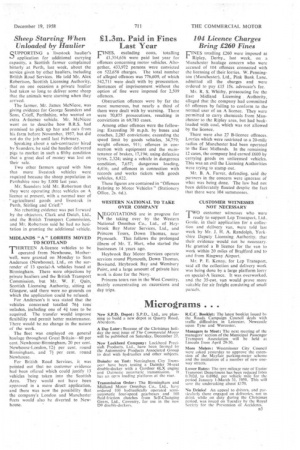Sheep Starving When Unloaded by Haulier
Page 37

If you've noticed an error in this article please click here to report it so we can fix it.
QUPPORTING a livestock haulier's application for additional carrying capacity, a Scottish farmer complained bitterly at Perth, last week, about the service given by other hauliers, including BritiSh Road Services. He told Mr. Alex Robertson, Scottish Licensing Authority, that on one occasion a private haulier had taken so long to deliver some sheep that the animals were starving when they arrived.
The farmer, Mr. James MeNicoe, was .giving evidence for George Saunders and Sons, Crieff, Perthshire, who wanted an extra A-licence vehicle. Mr. McNicoe went on to describe how B.R.S. had promised to pick up hay and oats from his farm before November, 1957, but did not do the job until last February.
Speaking about a sub-contractor hired by Saunders, he said the haulier delivered pigs to market in such a filthy condition that a great deal of money was lost on their sale.
Two other farmers agreed with him that more livestock vehicles were required because the sheep population in Perthshire rose by 5,000 last year.
Mr. Saunders told Mr. Robertson that they were operating three vehicles on A licence at present, with a normal user of "agricultural goods and livestock in Perth, Stirling and Crieff."
No rebutting evidence was put forward by the objectors, Clark and Dutch, Ltd., and the British Transport Commission, and Mr. Robertson said he had no hesitation in granting the additional vehicle.
MIDLANDS " A" LORRIES MOVED TO SCOTLAND
THIRTEEN A-licence vehicles to be operated from Newhouse, Mother-well, were granted on Monday. to Sam Anderson (Newhouse), Ltd., on the surrender of 13 special-A vehicles based at Birmingham. There were objections by private hauliers and the British Transport Commission, but Mr. W. F. Quin, Scottish Licensing Authority, sitting at Glasgow, said there were no grounds on which the application could be refused.
For Anderson's it was stated that the vehicles concerned totalled 76+ tons' unladen, including one of 41 tons to be acquired. The transfer would improve flexibility and permit better maintenance. There would be no change in the nature of the work.
The fleet was employed on general haulage throughout Great Britain-60 per cent. Newhouse-Birmingham, 20 per cent. Newhouse-London, 124 per cent. round Birmingham, and 7f. per cent. round Newhouse.
For British Road Services, it was pointed out that no customer evidence had been offered which could justify 13 vehicles being taken into the Scottish Area. They would not have been approved in a more direct application, and there was now the possibility that the company's London and Manchester fleets would also be diverted to Newhouse.




































































































